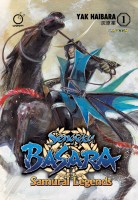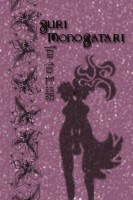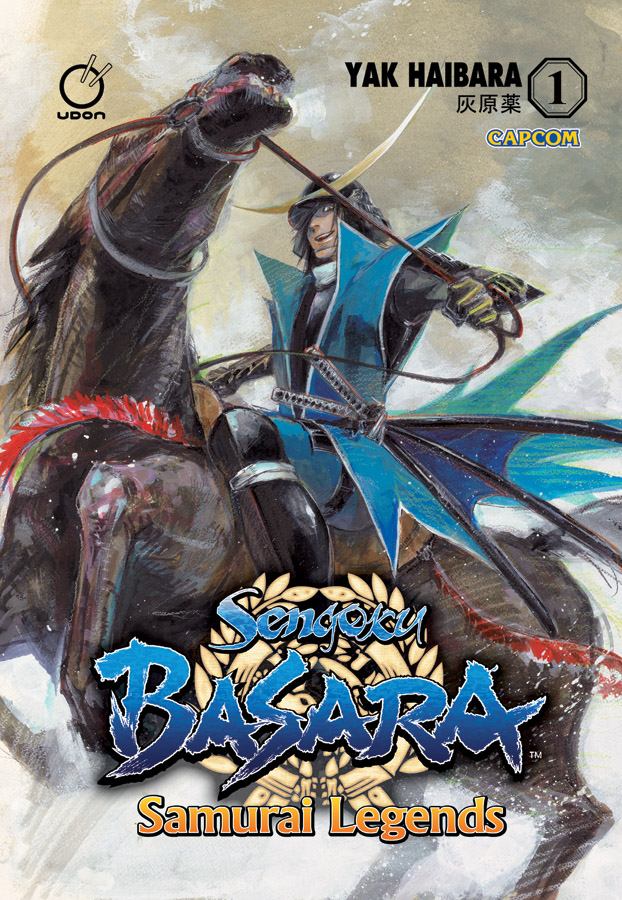My News and Reviews
I posted two in-depth reviews last week, one manga and one not. The first review was for Makoto Yukimura’s Vinland Saga, Omnibus 1. I was trying coordinate my review with the manga’s release, but unfortunately there was a delay through some distributors so not all of the books have yet arrived where they should. I’ve been hoping that Vinland Saga would be licensed in English for years. I wasn’t disappointed by the first omnibus and am looking forward the next one a great deal. The second review posted last week was for Laura Joh Rowland’s The Shogun’s Daughter. The novel is the seventeenth volume in her series of Tokugawa-era mystery and crime novels but the first one that I’ve actually read. I was annoyed by parts of the novel but the use of actual Japanese history is quite clever in The Shogun’s Daughter.
As for fun things found online, the most recent column of The Mike Toole Show, “Tiles Against Humanity,” focuses on mahjong anime and manga, particularly Akagi and Kaiji. I’ve professed my love of mahjong here at Experiments in Manga, so I’m always happy to come across others writing about the subject. This past weekend was the New York Comic Con and there were quite a few announcements to come out of it. My Manga Bookshelf cohorts have write-ups of the panels they attended: Melinda’s can be found under the NYCC tag and Sean’s are listed in the NYCC/NYAF category.
Some of the licenses at NYCC that particularly caught my attention include (but are certainly not limited to) Black Rose Alice by Setona Mizushiro, Terra Formars, and the Battle Royale side story Angels’ Border from Viz (which should go nicely with Haikasoru’s recently announced Battle Royale materials); Kodansha picked up two Attack on Titan spin-offs, Before the Fall and No Regrets (yup, the shoujo one) in addition to the Attack on Titan Junior High gag manga and the guidebooks; Vertical is also getting in on the Attack on Titan action, picking up the Before the Fall light novel series, and has also licensed Moyoco Anno’s manga In the Clothes Named Fat.
Quick Takes
 Nana, Volumes 19-21 by Ai Yazawa. Wow, this is one heck of a place for Nana to leave off—the tragedy that has been alluded to for so long has finally occurred and it is absolutely devastating. More and more of the series has actually been devoted to the incident’s aftermath and how it continues to affect the characters even years later, but the twenty-first volume is all about its immediate consequences. Heartbreaking only begins to describe it. Nana is a phenomenal series with fantastic characterizations. After Shin’s arrest, both the Black Stones and Trapnest begin to fall apart and the band members’ individual problems start to spin out of control. It’s very dramatic but the progression of the story feels natural and the characters’ development, reactions, and behaviour are all believable. Even if the series is never finished, Nana is well worth reading. I continue to be extremely impressed by Yazawa’s work. I wish her all the best as she continues to recover her health.
Nana, Volumes 19-21 by Ai Yazawa. Wow, this is one heck of a place for Nana to leave off—the tragedy that has been alluded to for so long has finally occurred and it is absolutely devastating. More and more of the series has actually been devoted to the incident’s aftermath and how it continues to affect the characters even years later, but the twenty-first volume is all about its immediate consequences. Heartbreaking only begins to describe it. Nana is a phenomenal series with fantastic characterizations. After Shin’s arrest, both the Black Stones and Trapnest begin to fall apart and the band members’ individual problems start to spin out of control. It’s very dramatic but the progression of the story feels natural and the characters’ development, reactions, and behaviour are all believable. Even if the series is never finished, Nana is well worth reading. I continue to be extremely impressed by Yazawa’s work. I wish her all the best as she continues to recover her health.
 Pretty Guardian Sailor Moon: Short Stories, Volume 1 by Naoko Takeuchi. Though it is not my favorite series, I enjoy Sailor Moon and am happy to see it doing so well. Kodansha released the main series in twelve volumes and is collecting the related short stories and bonus manga into two additional volumes. That being said, the short stories don’t really stand on their own very well. Fans of Sailor Moon will definitely be interested in them, but their appeal probably won’t extend very far beyond that. The stories in the first volume all tend towards the sillier, more lighthearted side of the series, focusing more on the characters’ everyday lives and less on their monumental confrontations with those who would destroy humanity. Although, there is a some of that, too. And the Sailor Guardian’s daily lives can be pretty hectic. I found the first volume of short stories to be mostly entertaining, but I would sigh a little bit to myself every time there was a dig at someone becoming “chunky.”
Pretty Guardian Sailor Moon: Short Stories, Volume 1 by Naoko Takeuchi. Though it is not my favorite series, I enjoy Sailor Moon and am happy to see it doing so well. Kodansha released the main series in twelve volumes and is collecting the related short stories and bonus manga into two additional volumes. That being said, the short stories don’t really stand on their own very well. Fans of Sailor Moon will definitely be interested in them, but their appeal probably won’t extend very far beyond that. The stories in the first volume all tend towards the sillier, more lighthearted side of the series, focusing more on the characters’ everyday lives and less on their monumental confrontations with those who would destroy humanity. Although, there is a some of that, too. And the Sailor Guardian’s daily lives can be pretty hectic. I found the first volume of short stories to be mostly entertaining, but I would sigh a little bit to myself every time there was a dig at someone becoming “chunky.”
 Sengoku Basara: Samurai Legends, Omnibus 1 (equivalent to Volumes 1-2) by Yak Haibara. I tend to be fairly wary of video game manga and so I ended up enjoying the first omnibus of Sengoku Basara: Samurai Legends far more than I ever expected. Samurai Legends is based on Sengoku Basara 2, the second game in the Sengoku Basara series, but no prior knowledge of the franchise is needed to enjoy the manga. Inspired by prominent historical events and figures of the Warring States Period, the story begins with the death of Oda Nobunaga at the burning of Honnou Temple and then follows the resulting power struggle. With marvelously over-the-top and dynamic battles and duels, humorous anachronisms, larger-than-life characters, and attractive artwork and designs, Samurai Legends is a tremendous amount of fun. There’s even a tiny bit of legitimate history, too. Samurai Legends is pretty great; I’ll definitely be picking up the second and final omnibus.
Sengoku Basara: Samurai Legends, Omnibus 1 (equivalent to Volumes 1-2) by Yak Haibara. I tend to be fairly wary of video game manga and so I ended up enjoying the first omnibus of Sengoku Basara: Samurai Legends far more than I ever expected. Samurai Legends is based on Sengoku Basara 2, the second game in the Sengoku Basara series, but no prior knowledge of the franchise is needed to enjoy the manga. Inspired by prominent historical events and figures of the Warring States Period, the story begins with the death of Oda Nobunaga at the burning of Honnou Temple and then follows the resulting power struggle. With marvelously over-the-top and dynamic battles and duels, humorous anachronisms, larger-than-life characters, and attractive artwork and designs, Samurai Legends is a tremendous amount of fun. There’s even a tiny bit of legitimate history, too. Samurai Legends is pretty great; I’ll definitely be picking up the second and final omnibus.
 Yuri Monogatari, Volumes 3-4 by Various. Although it was the third Yuri Monogatari collection that was nominated for a Lambda Literary Award, out of these two volumes I actually much prefer the fourth. Yuri Monogatari is an anthology that collects short, lesbian-themed comics from Japan, America, and Europe. I am glad to have discovered Yuri Monogatari for no other reason than the series has introduced me to the work of Althea Keaton—whose contributions continue to be some of my favorites—but I enjoy the other comics included as well. I was particularly fond of Tomomi Nakasora’s “Kissing the Petal” which not only features an endearing lesbian couple but also their close friend Chii, a transman who’s looking for a girlfriend. Yuri Monogatari has a nice mix of speculative fiction as well as pieces that are based in reality. The artwork isn’t always the strongest, but the stories are consistently engaging. Some are sweet while others are more sorrowful, but they’re all generally positive in tone.
Yuri Monogatari, Volumes 3-4 by Various. Although it was the third Yuri Monogatari collection that was nominated for a Lambda Literary Award, out of these two volumes I actually much prefer the fourth. Yuri Monogatari is an anthology that collects short, lesbian-themed comics from Japan, America, and Europe. I am glad to have discovered Yuri Monogatari for no other reason than the series has introduced me to the work of Althea Keaton—whose contributions continue to be some of my favorites—but I enjoy the other comics included as well. I was particularly fond of Tomomi Nakasora’s “Kissing the Petal” which not only features an endearing lesbian couple but also their close friend Chii, a transman who’s looking for a girlfriend. Yuri Monogatari has a nice mix of speculative fiction as well as pieces that are based in reality. The artwork isn’t always the strongest, but the stories are consistently engaging. Some are sweet while others are more sorrowful, but they’re all generally positive in tone.
 Attack on Titan directed by Tetsurō Araki. I’m not at all surprised that Hajime Isayama’s manga Attack on Titan was selected for an anime adaptation—it almost seems to be begging for it. For people who can’t get past the varying quality of Isayama’s artwork but who are still interested in the series’ story, the anime makes a good alternative and the animation is much more consistent. Some of the events are revealed in a slightly different order—the anime tends to be more chronological and employs fewer extended flashbacks than the manga—but otherwise the anime series is a very faithful adaptation of the original. Established fans of the manga will find things to like, too. It’s very cool to see the three-dimensional maneuvering gear in action, which something that the manga can’t convey to the same extent. The music in the Attack on Titan anime is also suitably epic with sweeping orchestral and choral pieces effectively increasing the drama of the humans’ confrontations with the titans.
Attack on Titan directed by Tetsurō Araki. I’m not at all surprised that Hajime Isayama’s manga Attack on Titan was selected for an anime adaptation—it almost seems to be begging for it. For people who can’t get past the varying quality of Isayama’s artwork but who are still interested in the series’ story, the anime makes a good alternative and the animation is much more consistent. Some of the events are revealed in a slightly different order—the anime tends to be more chronological and employs fewer extended flashbacks than the manga—but otherwise the anime series is a very faithful adaptation of the original. Established fans of the manga will find things to like, too. It’s very cool to see the three-dimensional maneuvering gear in action, which something that the manga can’t convey to the same extent. The music in the Attack on Titan anime is also suitably epic with sweeping orchestral and choral pieces effectively increasing the drama of the humans’ confrontations with the titans.

Leave a Reply